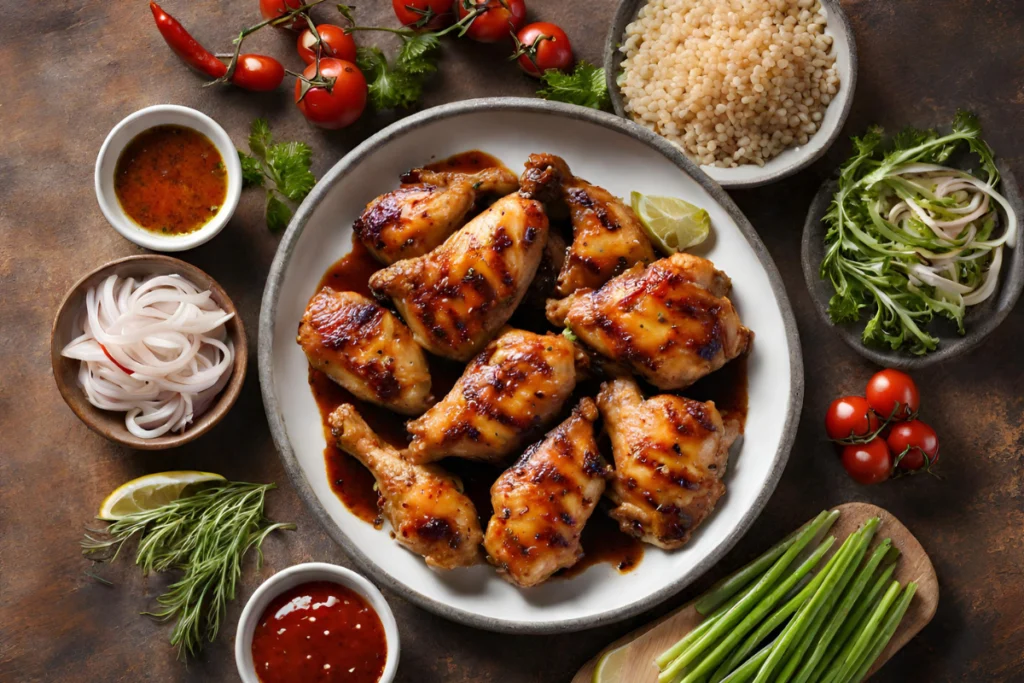
Introduction to Chicken Marination
Importance and Benefits of Marinating Chicken
Marinating chicken is not just about soaking it in flavorful liquid, it’s a crucial culinary technique that enhances the meat’s texture and taste. The process involves acids or enzymes, which tenderize the chicken by breaking down its proteins. This not only makes the chicken more succulent but also helps it cook more evenly.
Marinating adds a depth of flavor that simple seasoning alone can’t match. Whether you choose a simple mix of herbs and oil or a spicy blend, the marinade seeps into the chicken, guaranteeing that each bite bursts with flavor. Furthermore, marinating can reduce the development of harmful carcinogens that often form during the grilling and barbecuing process.
However, the timing is everything. Not all marinades work the same, and different cuts of chicken will require varying durations to marinate effectively without compromising the meat’s integrity. Let’s delve into the science behind marination and discover the optimal marination time for different types of chicken.
Understanding Marination
Definition and Purpose
At its core, marination is a method to infuse food, particularly meats like chicken, with flavor and tenderize it before cooking. A marinade is typically a mix of acid, oil, and spices. The acid—whether it’s lemon juice, vinegar, or yogurt—softens the meat’s surface by breaking down the proteins. This process not only flavors the meat but also enhances its texture, making it juicier and more tender.
The purpose of marination goes beyond tenderizing. It’s about layering complexities of flavor deep within the chicken. Whether you aim for the zesty kick of citrus or the mellow sweetness of dairy, these elements combine to elevate the ordinary into a culinary delight.
How Marinades Work
Marinades work by the dual action of acid and enzymes. Acids help in tenderizing the meat by weakening the protein structures. This reaction not only softens the meat but also allows it to retain more moisture during cooking, preventing it from drying out. Enzymes, on the other hand, play a crucial role in breaking down the proteins and connective tissues in the meat, which can significantly enhance the tenderness of the chicken.
However, the effectiveness of a marinade is not unlimited. The marinade’s penetration is generally superficial, affecting only the outer few millimeters of the meat. This means while the flavor may be robust on the surface, it diminishes as you get deeper into the meat. Therefore, for more thorough flavoring, smaller cuts or puncturing the meat can help the marinade reach deeper.
It’s also vital to balance the marination time. Marinating for too long, especially in a highly acidic marinade, can turn the chicken mushy as the proteins break down too much. In contrast, not marinating long enough might not allow enough time for the flavors to meld and tenderize the meat adequately. Understanding this balance is key to mastering the art of marination, ensuring that each bite of chicken is flavorful and tender without being overly soft or retaining too much of the raw marinade’s harsher tones.
Optimal Marination Times
Minimum and Maximum Marination Times
Understanding the ideal marination time is essential to ensure that your chicken is flavorful without compromising its texture. Generally, a brief marination period can impart surface-level taste and slight tenderization, suitable for when time is of the essence. Conversely, longer marination times allow deeper penetration of flavors and more significant tenderization, which is perfect for tougher cuts or when you desire a more profound flavor profile.
For chicken breasts, the most commonly cooked cut, marinating for 30 minutes to 2 hours is often sufficient. These lean cuts absorb flavors quickly and can become overly soft if left in acidic marinades for too long. For darker and tougher cuts like thighs and drumsticks, extending the marination time to 2-4 hours can enhance tenderness and flavor without the risk of turning the meat mushy.
Recommendations for Different Cuts
- Chicken Breasts: Quick and effective, a 2-hour limit is ideal to maintain moisture and texture while still allowing the marinade to enhance the meat’s flavor. A shorter marination period is often recommended, especially if using acid-based marinades, to avoid toughening the meat.
- Dark Meat (Thighs and Drumsticks): These cuts benefit from longer marination times of up to 4 hours due to their higher fat content and tougher texture. The longer marination period helps in breaking down the tissues, thus rendering them more tender and flavorful.
- Whole Chicken: When marinating a whole chicken, 4 to 12 hours or even overnight is advisable, depending on the marinade’s acidity. Whole chickens require longer marination times to ensure the flavor penetrates beyond the surface.
It’s crucial to use a refrigerator for marinating chicken to prevent bacterial growth and foodborne illnesses. Never marinate chicken at room temperature, and always discard used marinade to maintain food safety.
Types of Marinades
Acidic, Enzymatic, and Dairy-Based Marinades
Exploring the types of marinades can open up a world of flavors for your chicken dishes. Each type of marinade has unique characteristics that affect how they tenderize and flavor the meat.
- Acidic Marinades: These marinades typically include ingredients like lemon juice, vinegar, or even tomato sauce. They are excellent for breaking down tough proteins quickly. However, because of their potency, acidic marinades should be used cautiously—especially with tender cuts like chicken breast—to avoid over-tenderizing and making the meat mushy.
- Enzymatic Marinades: Ingredients like pineapple, papaya, mango, and kiwi contain natural enzymes that break down proteins effectively. These tropical fruits can tenderize chicken deeply while infusing it with a sweet, unique flavor. It’s essential to monitor marination times closely with enzymatic marinades as they can turn the meat too soft if left for too long.
- Dairy-Based Marinades: Yogurt and buttermilk are milder alternatives that tenderize the chicken without the risk of toughening the meat. These marinades are particularly good for creating a creamy texture and flavor. They act slower than acidic marinades, making them suitable for longer marination periods. Dairy-based marinades work wonderfully for dishes like tandoori chicken, where you want a gentle infusion of spices.
Common Ingredients: Citrus, Yogurt, Vinegar
- Citrus: Adding ingredients like lemon or lime not only imparts a vibrant zest but also enhances the meat’s overall tenderness. Citrus marinades are perfect for a quick flavor boost before grilling.
- Yogurt: This ingredient is a staple in many Middle Eastern and Indian recipes. Yogurt envelops the chicken in a thick, rich coating that not only tenderizes but also helps spices cling to the meat, creating layers of flavor.
- Vinegar: A versatile marinade base, vinegar can be used in numerous culinary styles, from Asian to American BBQ. It penetrates well into the meat and provides a sharp tang that balances the natural sweetness of chicken.
Marination Techniques
Preparing Your Chicken for Marination
Preparation is key to ensuring your chicken absorbs as much flavor as possible from the marinade. Here are a few tips to get you started:
- Cleaning and Trimming: Begin by thoroughly cleaning your chicken and removing any excess fat or skin that might hinder the marinade’s penetration.
- Piercing or Slicing: To help the marinade seep deeper into the meat, lightly pierce the surface of the chicken with a fork or make shallow cuts on the surface. This is especially effective for thicker cuts like chicken breasts.
- Using the Right Container: Always marinate chicken in non-reactive containers such as glass, ceramic, or plastic. Metal containers can react with acidic marinades and alter the flavor of the chicken.
Safety Precautions and Tips
Food safety should never be overlooked when marinating chicken. Here are essential practices to keep in mind:
- Refrigerate While Marinating: Chicken should be marinated in the refrigerator, not at room temperature, to prevent bacterial growth. The ideal temperature is below 40°F (4°C).
- Avoid Cross-Contamination: Use separate utensils and plates for raw and cooked chicken to avoid cross-contamination.
- Marinade Management: Never use marinade from raw chicken as a sauce unless it is boiled first to destroy harmful bacteria. It’s safer to set aside a portion of the marinade before adding the chicken if you plan to use it for basting or as a serving sauce.
How to Cook Marinated Chicken
Different Cooking Methods
Once your chicken is marinated, choosing the right cooking method is crucial to maximize the flavors you’ve infused. Here are some popular methods tailored to different marinades:
- Grilling: Ideal for chicken marinated in oil-based or acidic marinades. The high heat quickly sears the meat, locking in flavors and creating a delicious charred exterior. Make sure to preheat your grill and cook over medium-high heat to avoid burning the marinade.
- Baking: Perfect for dairy-based or thick marinades like yogurt. Baking at a moderate temperature allows the chicken to cook evenly and retain moisture, which is essential for thicker cuts like breasts or whole chickens.
- Sautéing: Excellent for quickly cooking smaller or thinner cuts of chicken, such as slices or strips marinated in light, flavorful liquids. Sautéing in a hot pan adds a nice caramelization to the exterior while keeping the inside tender.
Adjustments for Marinated Chicken
Cooking marinated chicken requires some adjustments to ensure the best outcome:
- Temperature and Timing: Marinated chicken often cooks faster than non-marinated, especially if the marinade contains acid or enzymes that pre-tenderize the meat. It’s important to monitor the chicken closely and adjust cooking times accordingly.
- Managing Flare-Ups: When grilling marinated chicken, dripping marinade can cause flare-ups. Keep a spray bottle of water handy to manage flames and avoid charring the meat excessively.
- Resting: Allow the cooked chicken to rest for a few minutes after cooking. This helps redistribute the juices throughout the meat, ensuring that every bite is moist and flavorful.
By understanding these cooking techniques and making necessary adjustments, you can fully capitalize on the enhanced flavors and textures that marination provides. Cooking marinated chicken correctly not only optimizes taste but also ensures a delightful texture, making your meal truly memorable.
Conclusion
As we conclude our exploration into the art of marinating chicken, we hope this guide has provided you with a comprehensive understanding of how to enhance your chicken dishes through thoughtful marination. From selecting the right marinades based on the cut of chicken to understanding the crucial marination times for optimal flavor infusion and tenderness, each step plays a significant role in the culinary process.
Moreover, the importance of adhering to food safety guidelines cannot be overstressed. By marinating chicken under proper conditions, cooking it to the right temperatures, and handling it with care, you not only ensure delicious results but also maintain the health and safety of those enjoying your meals.
Finally, remember that cooking is both an art and a science. The more you experiment with different marinades and techniques, the more adept you will become at tailoring the process to suit your taste preferences and the specific demands of each recipe. Whether you’re preparing a quick family dinner or a special feast, the skills you’ve developed through understanding and applying proper marination techniques will undoubtedly elevate your cooking, making every meal memorable and satisfying.
FAQs
How long should chicken be marinated?
Generally, you should marinate chicken for anywhere from 30 minutes to 12 hours, depending on the marinade type and the chicken cut. For instance, you should limit acidic marinades, such as those with vinegar or citrus juices, to a shorter duration—ranging from 30 minutes to a few hours—to avoid making the meat mushy. Conversely, you can marinate chicken for longer periods using gentler marinades that contain dairy or enzymes.
What is the minimum time for marinating?
The minimum time for marinating chicken to infuse it with enough flavor and achieve some tenderizing effect is typically around 30 minutes. This is especially true for thinner cuts or smaller pieces of chicken, which absorb flavors more quickly than larger cuts.
How long can we keep marinated chicken in the fridge?
Marinated chicken can be kept in the refrigerator for up to two days, depending on the ingredients in the marinade. It’s important to store it in a covered dish or a sealed bag to avoid cross-contamination and to maintain safety and freshness.
Does marinating longer make a difference?
Marinating chicken for longer periods can make a difference in flavor and tenderness up to a point. A longer marination time allows the flavors to penetrate deeper into the meat. However, if the marinade is highly acidic, marinating for too long can actually toughen the meat or turn it mushy as the acids begin to cook the proteins. For most recipes, marinating beyond 24 hours is generally not recommended and can be counterproductive.

